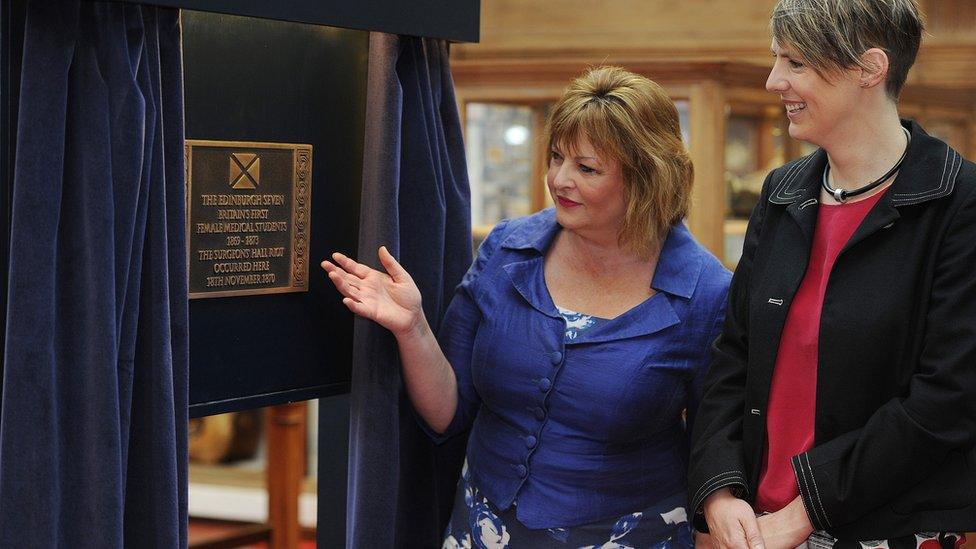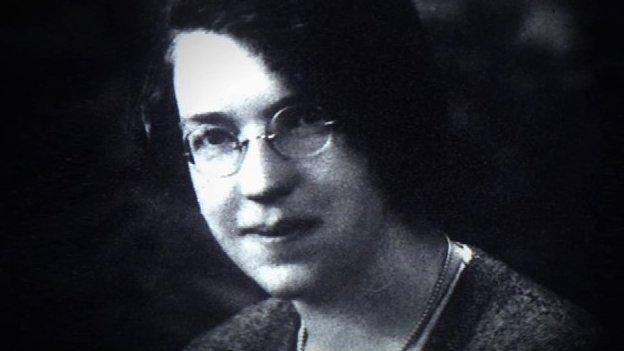'Edinburgh Seven' honoured with plaque in Edinburgh
- Published

The first women to be admitted on a degree programme at any British University have been commemorated in Edinburgh.
A plaque was unveiled at Edinburgh University, where the women matriculated to study medicine in 1869.
They are known collectively as 'The Edinburgh Seven'.
They are one of eight historical groups or figures to be recognised by the Historic Scotland commemorative plaques scheme, now in its fourth year.
The Edinburgh Seven were Sophia Jex-Blake, Isabel Thorne, Edith Pechey, Matilda Chaplin, Helen Evans, Mary Anderson, and Emily Bovell.
In one incident, they were barred from attending an anatomy class by a large crowd and pelted with rubbish in what became known as the Surgeon's Hall Riot.
The plaque was unveiled by Cabinet Secretary for Culture, Europe and External Affairs Fiona Hyslop at a ceremony in Edinburgh University's anatomical museum.
Ms Hyslop said: "Their determination to simply attend university and study medicine is an endeavour we take for granted these days, but at the time their actions were extraordinary enough to attract widespread criticism from all areas of society, even inciting a riot on the streets of Edinburgh.
"Their situation put women's right to study on the national political agenda, and helped lead to women being admitted to universities in Britain for the first time.
"It would be difficult to overstate how important this development was, as it gave the opportunity for women to participate in professions which were previously unattainable and determine their own career paths."
'Turning point'
Professor Jane Norman, Vice Principal of People and Culture at Edinburgh University, said: "The Surgeons' Hall Riot marked a turning point in the campaign for women's right to a university education - attracting widespread publicity and winning greater political support.
"I am delighted that the Edinburgh Seven are being recognised for their role in this important historical moment and the drive for equality in education."
The Historic Scotland scheme celebrates the life and achievements of significant historic figures through the erection of a plaque on the home where they lived or a building synonymous with their achievements.


A plaque in memory of Jane Haining will be installed at Dunscore Parish Church in Dumfries and Galloway
A Christian missionary who died at Auschwitz concentration camp is among the others who will have a plaque unveiled in recognition of their work.
Jane Haining was killed at the Nazi death camp in 1944 after dedicating her life to working with Jewish children in Budapest.

Nominations are submitted by the public before an independent panel of experts reviews and selects the final winners.
Martin Ross, policy and projects manager at Historic Scotland said: "In the last four years the number of nominations to the scheme has grown rapidly, and this latest round produced a wide range of potential recipients, from a broad spectrum of society.
"The end result is eight recipients who have undoubtedly contributed significantly to the advancement of their particular field, both in Scotland and in many cases further afield."
The plaque is due to be mounted on one of the gateposts of the Royal College of Surgeons on Nicholson Street in Edinburgh as soon as maintenance work to that building is complete.